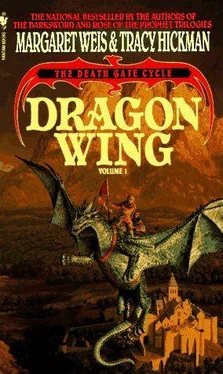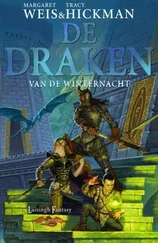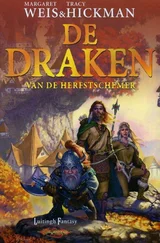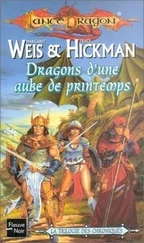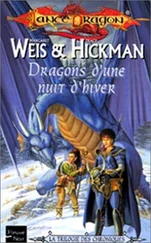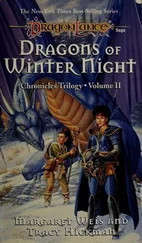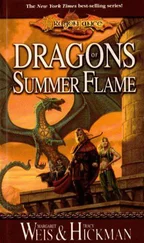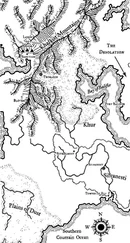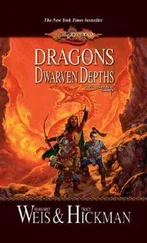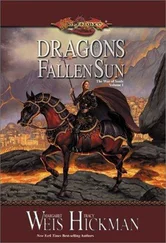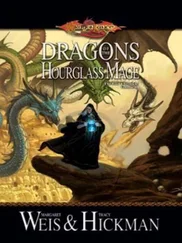Margaret Weis - Dragon Wing
Здесь есть возможность читать онлайн «Margaret Weis - Dragon Wing» весь текст электронной книги совершенно бесплатно (целиком полную версию без сокращений). В некоторых случаях можно слушать аудио, скачать через торрент в формате fb2 и присутствует краткое содержание. Жанр: Фэнтези, на английском языке. Описание произведения, (предисловие) а так же отзывы посетителей доступны на портале библиотеки ЛибКат.
- Название:Dragon Wing
- Автор:
- Жанр:
- Год:неизвестен
- ISBN:нет данных
- Рейтинг книги:3 / 5. Голосов: 1
-
Избранное:Добавить в избранное
- Отзывы:
-
Ваша оценка:
- 60
- 1
- 2
- 3
- 4
- 5
Dragon Wing: краткое содержание, описание и аннотация
Предлагаем к чтению аннотацию, описание, краткое содержание или предисловие (зависит от того, что написал сам автор книги «Dragon Wing»). Если вы не нашли необходимую информацию о книге — напишите в комментариях, мы постараемся отыскать её.
Dragon Wing — читать онлайн бесплатно полную книгу (весь текст) целиком
Ниже представлен текст книги, разбитый по страницам. Система сохранения места последней прочитанной страницы, позволяет с удобством читать онлайн бесплатно книгу «Dragon Wing», без необходимости каждый раз заново искать на чём Вы остановились. Поставьте закладку, и сможете в любой момент перейти на страницу, на которой закончили чтение.
Интервал:
Закладка:
Limbeck was, in his own language, a Geg. In any other language in Arianus, or in the ancient world before the Sundering, he would have been known as a dwarf. He stood a respectable four feet in height (without shoes). A full and luxuriant growth of beard adorned a cheerful, open face. He was developing a slight paunch, unusual in a hardworking young adult Geg, but that was due to the fact that he sat a great deal. Limbeck’s eyes were bright, inquisitive, and extremely nearsighted.
He lived in a small cavern amid hundreds of other caverns that honeycombed a large mound of coralite located on the outskirts of Het. Limbeck’s cave was different in certain respects from those of his neighbors, which seemed fitting since Limbeck himself was certainly an unusual Geg. His cave was taller than the others, being almost two Gegs high. A special platform, built of knobwood planks, allowed Limbeck to climb up to the ceiling of his dwelling and enjoy another of the cavern’s oddities—windows.
Most Gegs didn’t need windows; the storms that buffeted the isle made windows impractical, and in general, the Gegs were far more concerned with what was going on inside than outside. A few of the city’s original buildings—the ones that had been built long, long ago by the hallowed and revered Mangers—had windows, however. Small panes of thick, bubble-filled glass set into recessed holes in the sturdy walls, the windows were perfectly suited to a lifetime of battering wind, rain, and hail. It was windows such as these that Limbeck had confiscated from an unused building in the center of town and transported to his cavern. A few turns of a borrowed bore-hoogus created the perfect-size openings for two windows on the ground floor and four more up above. In this, Limbeck established the major difference between himself and the majority of his people. They looked only within. Limbeck liked to look without—even if looking without only brought visions of slashing rain and hail and lightning or (during those brief periods when the storms subsided) the vat-things and hummer coils and blazing bluezuzts of the Kicksey-Winsey. One other feature of Limbeck’s dwelling made it positively unique. On the front door, which faced the interior of the mound and its interconnecting streets, was a sign with the letters WUPP painted in red, marching along boldly at a definite uphill slant.
In all other aspects, the dwelling was a typical Geg dwelling—the furniture was functional and made out of whatever material the Gegs could find, there were no frivolous decorations. None could be found that would stay put. The walls and floors and ceiling of the snug cavern shook and quivered with the thumping, throbbing, whumping, zizzt, crackle, and clanging of the Kicksey-Winsey—the dominant feature, the dominant force on Drevlin. Limbeck, the august leader of WUPP, did not mind the noise. He took comfort in it, having listened to it, albeit somewhat muffled, in his mother’s womb. The Gegs revered the noise, just as they revered the Kicksey-Winsey. They knew that if the noise ceased their world would come to an end. Death was known among the Gegs as the Endless Hear Nothing.
Wrapped in the comforting banging and drumming, Limbeck struggled with his speech. Words came easily to him. Writing them down did not. What sounded fine and grand and noble when it came out of his mouth looked trite and pretentious when he saw it on paper. At least it did to Limbeck. Jarre always told him he was far too critical of himself, that his speeches read just as well as they sounded. But, as Limbeck always replied with a fond kiss on her cheek, Jarre was prejudiced.
Limbeck talked aloud as he wrote, in order to hear his words spoken. Being extremely nearsighted and finding it difficult to focus properly when he wore his spectacles, Limbeck invariably took them off when writing. His face pressed close to the paper, his quill scratching away, he got nearly as much ink up his nose and down his beard as he did on his speech.
“It is therefore our purpose, as Worshipers United for Progress and Prosperity, to bring to our people a time of good living now, not sometime in a future that may never come!” Limbeck, carried away, banged his fist on the table, sloshing ink out of the inkwell. A small river of blue crept toward the paper, threatening to inundate the speech. Limbeck stemmed the tide with his elbow; his frayed tunic soaked up the ink thirstily. Since the tunic had long ago lost any color it might have once possessed, the purple splotch on the sleeve was a cheerful improvement.
“For centuries we have been told by our leaders that we were placed in this realm of Storm and Chaos because we were not deemed worthy to take our place with the Welves above. We who are flesh and blood and bone could not hope to live in the land of the immortals. When we are worthy, our leaders tell us, then the Welves will come from Above and pass judgment on us and we shall rise up into the heavens. In the meantime, it is our duty to serve the Kicksey-Winsey and wait for that great day. I say”—here Limbeck raised a clenched and inky fist above his head—“I say that day will never come!
“I say that we have been lied to! Our leaders deluded! It is easy enough for the High Froman and the people of his scrift to talk of waiting for change until Judgment comes. They do not need a better life. They receive the God’s payment. But do they disperse it equally among us? No, they make us pay, and pay dearly, for our share that we have already earned by the sweat of our brow!”
(I must pause here for cheering, Limbeck decided, and put a blot that was supposed to be a star to mark the place.)
“It is time to rise up and—” Limbeck hushed, thinking he heard a strange sound. Now, how anyone could hear anything in this land, other than the noise of the Kicksey-Winsey and the buffeting and roaring of the storms that swept daily over Drevlin, was a mystery to the Welves who came monthly for their shipment of water. But the Gegs, accustomed to the deafening noises, minded them no more than the rush of air through the leaves of a tree would bother an elflord of Tribus. A Geg could sleep soundly through a ferocious thunderstorm and start bolt upright at the rustle of a mouse in his pantry. It was the sound of distant shouting that aroused Limbeck’s attention and, stricken by sudden consciousness, he peered up at a timekeeping device (his own invention) set in a hollow of the wall. A complex combination of whirly-wheels and spokey-spikes, the device dropped one bean every hour on the hour into a jar below. Each morning, Limbeck emptied the jar of beans into the funnel above, and the measuring of the day began again.
Leaping to his feet, Limbeck peered nearsightedly into the jar, hastily counting up the beans. He groaned. He was late. Grabbing a coat, he was heading out the door when, at that moment, the next line in his speech occurred to him. He decided to take just a second to record it and sat back down. All thoughts of his appointment went clean out of his mind. Ink-bedaubed and happy, he once more lost himself in his rhetoric.
“We, the Worshipers United for Progress and Prosperity, advocate three tenets: The first, all of the scrifts should come together and pool their knowledge of the Kicksey-Winsey and learn how it operates so that we become its masters, not its slaves. [Blot for cheering.] The second, worshipers quit waiting for a day of Judgment and start to work now to better the quality of their own lives. [Another blot.] The third, worshipers should go to the Froman and demand a fair share in the Welves’ payment. [Two blots and a scribble.]” At this juncture. Limbeck sighed. He knew, from past experience, that his third tenet would be the most popular with the young Gegs impatient over serving long hours for inadequate pay. But of the three, Limbeck himself knew it to be the least important.
Читать дальшеИнтервал:
Закладка:
Похожие книги на «Dragon Wing»
Представляем Вашему вниманию похожие книги на «Dragon Wing» списком для выбора. Мы отобрали схожую по названию и смыслу литературу в надежде предоставить читателям больше вариантов отыскать новые, интересные, ещё непрочитанные произведения.
Обсуждение, отзывы о книге «Dragon Wing» и просто собственные мнения читателей. Оставьте ваши комментарии, напишите, что Вы думаете о произведении, его смысле или главных героях. Укажите что конкретно понравилось, а что нет, и почему Вы так считаете.
